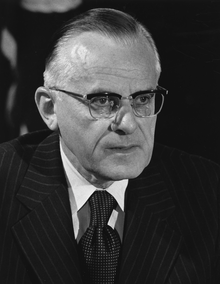Earl Butz
Earl Lauer Butz (* 3. July 1909 in Albion , Noble County , Indiana ; † 2. February 2008 in Washington, DC ) was an American politician ( Republican Party ) and Minister of Agriculture of the United States under Presidents Richard Nixon and Gerald Ford .
Life
Butz was born in 1909 as the son of a farmer. He attended Wawaka High School in Indiana and then studied at Purdue University in Lafayette Agriculture, where he passed a bachelor's degree in 1932. Since 1933 he was employed as a farmer in Noble County and worked from 1934 to 1935 as a research assistant at Purdue University. The following year he became a researcher and did economic work. He completed meanwhile in 1936 a postgraduate study at the University of Chicago . He did this at the Federal Agricultural Bank in Louisville , Kentucky , from which he returned to Purdue University a year later. There he finally received his doctorate in 1937 and then worked as a lecturer until 1939. He embarked on a professorial career and was employed as a full professor of agricultural sciences in 1946, which he remained until 1965. He was also the dean of the college's agricultural faculty.
Butz has also taught at many other colleges in the United States, such as the University of Wisconsin and Rutgers University. He was also a director of many American firms, including the Standard Life Insurance Company of Indiana , the JI Case Company in Racine , Wisconsin, and the Ralston Purina Co. in St. Louis . He was married to Mary Emma Powell since 1937, with whom he had two sons.
politics
Politically, Butz first worked from 1954 to 1957, when he was Deputy Minister of Agriculture under Dwight D. Eisenhower . He then became again Dean of the Faculty of Agriculture at Purdue University . After his retirement, he concentrated on his director positions until he was appointed the new American Secretary of Agriculture by Richard Nixon in November 1971. His predecessor Clifford M. Hardin was no longer deployed for tactical reasons, as Butz came from the agricultural Midwest and the luckless Hardin was no longer trusted to solve the problems of agriculture. Butz's confirmation as the new minister in the Senate was tight: only 51 senators voted for him, 46 against him.
Butz abolished market support measures ( Henry A. Wallace's " Ever-Normal Granary "). He sparked a production expansion, especially in corn and so fired the structural change ( english get big or get out ).
After the Soviet Union suffered a crop failure, Butz was sent to the USSR in April 1972 to negotiate the sale of surplus grain from the United States. He remained in his cabinet after Nixon's re-election in November 1972 and also held the post of Minister under Gerald Ford after Nixon's resignation in 1974 . Butz resigned on October 4, 1976 after making a racist joke that, although private, was published in the press. In order not to harm Ford in the election campaign, he resigned.
Publications
- The Production Credit System for Farmers (1944)
- Seasonal Variation of Food Farm Prices (1942)
- Veal Calf Prices in Indiana (1944)
- Price Fixings for Food Stuffs (1952)
- Seasonal Price Variations and Economy of Feeds in Indiana (1943), with Eugene G. Byer
literature
- Earl L. Butz , in: Internationales Biographisches Archiv 05/1977 of January 24, 1977, in the Munzinger Archive ( beginning of the article freely available)
Individual evidence
- ↑ Michael Carlson: Obituary: Earl Butz. In: The Guardian . February 4, 2008, accessed September 4, 2015 .
Web links
- Earl Butz in the Miller Center of Public Affairs of the University of Virginia (English)
| personal data | |
|---|---|
| SURNAME | Butz, Earl |
| ALTERNATIVE NAMES | Butz, Earl Lauer |
| BRIEF DESCRIPTION | American politician and Secretary of Agriculture |
| DATE OF BIRTH | 3rd July 1909 |
| PLACE OF BIRTH | Albion , Indiana |
| DATE OF DEATH | February 2, 2008 |
| Place of death | Washington, DC |
